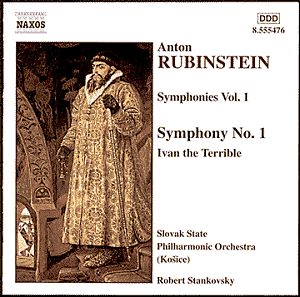Anton RUBINSTEIN (1829-1894)
Symphony No. 1, Op. 40 (1850)
Allegro con fuoco
Allegro
Moderato
Allegro
Ivan the Terrible, Op. 79 (1869)
 Slovak State Philharmonic
Orchestra/Stankovsky
Slovak State Philharmonic
Orchestra/Stankovsky
Rec. 1989 at the House of Arts, Kosice, Slovakia
 NAXOS 8.555476
[60.29]
NAXOS 8.555476
[60.29]
Crotchet
AmazonUK
AmazonUS
Amazon
recommendations

We remember Anton RUBINSTEIN as an outstanding pianist who rivalled,
and even outshone, Liszt. He gave his first public concert when aged 10 and
toured Scandinavia, Austria, Germany, London and Paris as a child virtuoso.
The family settled in Berlin where Rubinstein took lessons in counterpoint
and harmony from Glinka's former teacher, Dehn. Returning to Russia he became
director of St Petersburg Conservatorium until 1867 he had turned his back
on the nationalistic style of his Russian contemporaries, (Balakirev, Borodin,
Mussorgsky, Rimsky-Korsakov, César Cui) and followed the traditions
of the German school. As the son of German-Jewish parents who had chosen
to become Christians he shared with Mendelssohn a similar background and
was influenced by his style of composition.
The Symphony No. 1 in F Major is a charming and well-crafted work,
written at a time when Rubinstein was in St Petersburg, being supported by
the Grand Duchess Elena Pavlovna, sister-in-law of the Tsar. The work has
strong influences of Mendelssohn (who died three years previously) with a
clear framework, memorable themes and dynamic rhythms. This symphony combines
technical skill with romantic charm.
An Allegro con fuoco begins brightly and moves forward with lively
rhythm and purpose; Schubert very much in mind. Characteristically Mendelssohnian
wind passages follow before being interrupted by abrupt chords from the strings.
A mixture of purposeful effervescence and strong lilting Schubertian rhythm
later pervades the movement. Rubinstein's skill in the mastery of techniques
developed by the German school is very much in evidence. An Allegro
then follows which opens with a hint of Smetana and a theme which provides
a jolly first subject with playful wind joining in. A contrasting languid
second subject maintains the pace briefly before reverting to the first subject.
The Moderato introduces a melancholy funereal subject later becomes
reminiscent of the marching theme in the second movement of Mendelssohn's
Italian before hints of Midsummer Night's Dream break in. The
ominous marching cellos and basses then continue with an airy theme carried
by superimposed strings which eventually fade away. A final Allegro
brings in sprightly thematic material with flutes and piccolo, again reminding
one of Mendelssohn and Sullivan, particularly their Hebrides and
L'Ile Enchantée respectively.
Ivan the Terrible, described as a 'musical portrait', is,
surprisingly, a lively, stately and majestic piece which gives way to an
undercurrent of mildly tense moments. It contains some characteristically
Russian elements and is based on a play by Mey recounting the story of the
Tsar's attack on Novgorod, and leading to the death of the Tsar's daughter
whom he loved. We need to remember that this work, written in 1869, came
long before Rimsky-Korsakov's The Maid of Pskov (1877) and The
Tsar's Bride (1899) in which profiles of Ivan the Terrible feature.
This disc is a reissue of a recording which first appeared as a Marco Polo
release. We owe it to Marco Polo for bringing out a series of five of
Rubinstein's forgotten symphonies as well as his two Concertos for Piano
& Orchestra.
The CD is well recorded and the orchestra play competently under Robert
Stankovsky who studied at the Bratislava Conservatorium. Aged only 25 when
he made this recording, he is regarded as one of the best conductors in the
Czech Republic and Slovakia. Kosice lies in a province which boasts a long
tradition of providing Vienna with good musicians.
The disc carries good notes on the composer and works in English, French
and German.
Raymond Walker
RUBINSTEIN Symphony CDs - Marco Polo
Symphony No.2, Slovak PO/Gunzenhauser Marco Polo 8.220449
Symphony No.4, Czech PO/Stankovsky Marco Polo 8.223319
Symphony No.5, Bucharest George Enescu PO/Andreescu Marco Polo 8.223320
Symphony No.6, Phil Hungarica/Varga Marco Polo 8.220449
It is not known whether these CDs will be reissued on Naxos but on the basis
of this review they will provide interesting listening.

